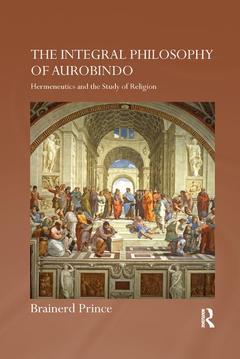The Integral Philosophy of Aurobindo Hermeneutics and the Study of Religion Routledge Hindu Studies Series
Auteur : Prince Brainerd

Sri Aurobindo was an Indian nationalist, philosopher, yogi, guru, and poet. This book is an enquiry into the integral philosophy of Aurobindo and its contemporary relevance. It offers a reading of Aurobindo?s key texts by bringing them into conversation with religious studies and the hermeneutical traditions. The central argument is that Aurobindo?s integral philosophy is best understood as a hermeneutical philosophy of religion.
Such an understanding of Aurobindo?s philosophy, offering both substantive and methodological insights for the academic study of religion, subdivides into three interrelated aims. The first is to demonstrate that the power of the Aurobindonian vision lies in its self-conception as a traditionary-hermeneutical enquiry into religion; the second, to draw substantive insights from Aurobindo?s enquiry to envision a way beyond the impasse within the current religious-secular debate in the academic study of religion. Working out of the condition of secularism, the dominant secularists demand the abandonment of the category ?religion? and the dismantling of the academic discipline of religious studies. Aurobindo?s integral work on ?religion?, arising out of the Ved?nta tradition, critiques the condition of secularity that undergirds the religious-secular debate. Finally, informed by the hermeneutical tradition and building on the methodological insights from Aurobindo's integral method, the book explores a hermeneutical approach for the study of religion which is dialogical in nature.
This book will be of interest to academics studying Religious Studies, Philosophy of Religion, Continental Hermeneutics, Modern India, Modern Hinduism as well as South Asian Studies.
Preface
1. Introduction: Mapping the Journey
2. Conceptual Groundwork: Aurobindo, Hermeneutics and Religion
3. The Life Divine – I: Whose Tradition? Which Rationality?
4. The Life Divine – II: Transcendence and the Sevenfold Being
5. The Human Cycle: Articulation as Narrative
6. The Synthesis of Yoga: Action, Yoga and Tradition
7. Conclusion: The Journey and Beyond
Glossary
Brainerd Prince is a Visiting Research Tutor at the Oxford Centre for Mission Studies, UK. He is also a Research Fellow at the Oxford Centre for Hindu Studies, a Recognized Independent Centre of Oxford University, UK, and the Founding Director of the Samvada Centre for Research Resources, New Delhi, India.
Date de parution : 08-2018
15.6x23.4 cm
Disponible chez l'éditeur (délai d'approvisionnement : 14 jours).
Prix indicatif 53,83 €
Ajouter au panierDate de parution : 01-2017
15.6x23.4 cm
Disponible chez l'éditeur (délai d'approvisionnement : 14 jours).
Prix indicatif 178,41 €
Ajouter au panierThème de The Integral Philosophy of Aurobindo :
Mots-clés :
Religious Secular Debate; religious; Aurobindo’s Critique; secular; Aurobindo’s Enquiry; debate; Dialogical Hermeneutics; Traditionary Hermeneutical Enquiry; Dialogical Hermeneutics Approach; Religious Secular Binary; Sri Aurobindo; Aurobindo's Philosophy; Religious Studies Tradition; Aurobindo’s Work; Greater Transcendence; Human Cycle; Peter Heehs; Yogic Action; Religion Secular Dichotomy; Master Apprentice Relationship; Subject Object Distinctions; Yogic Practices; Epistemological Reductionism; Ontologically Inadequate; MacIntyrean Project; Contemporary Academic Study; Group Soul; Sri Aurobindo Ashram



